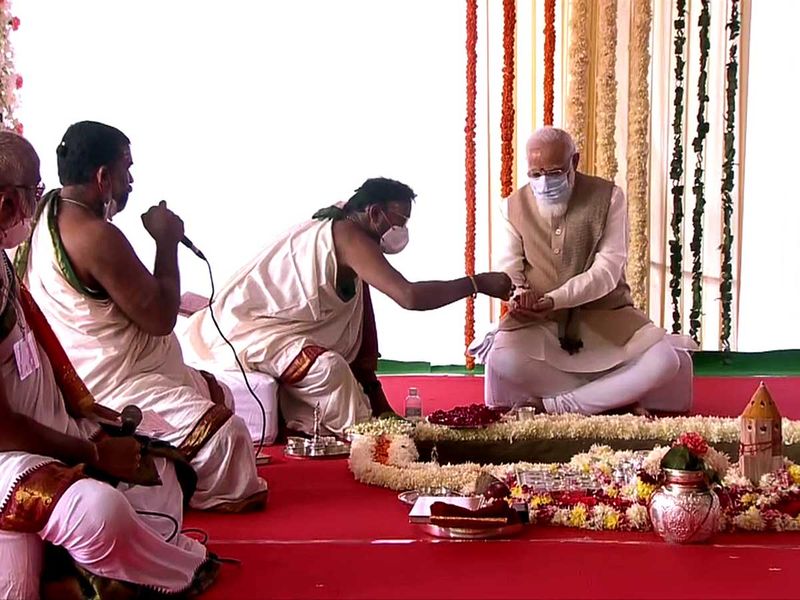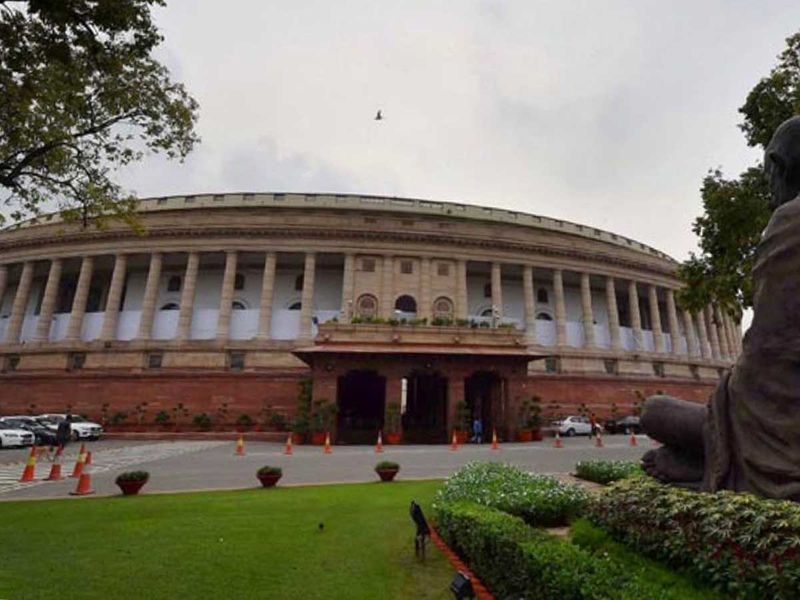Dubai: India’s Prime Minister Narendra Modi laid the foundation stone of a new Parliament building on Thursday, and said it would be a symbol of Atmanirbhar Bharat (self-reliant India).
The new building, adjacent to the existing one, is proposed to be completed in 2022 when the country will celebrate its 75th year of Independence. “If work is done to fulfil the needs of the country in the old Parliament House, then the aspirations of 21st century India will be fulfilled in the new building,” Modi told members of Parliament and other dignitaries at the Parliament House premises.
The new building is the centrepiece of a grand redevelopment of New Delhi’s colonial-era core and will be built on an area of 64,500 sq metres at an estimated cost of Rs9.71 billion ($130 million).

The area, designed in the early 20th century by British architect Edwin Lutyens, also comprises the Rajpath boulevard, the president’s residence, government offices, the national museum and the India Gate war memorial.
Modi’s overhaul of the sweeping, tree-lined and lawned vista will see it enclosed by rows of new government buildings and the prime minister’s office shifted and enlarged.
Part of the old parliament will be “retrofitted” and will continue to be used for government business, while other buildings will reportedly be turned into museums. Some will be demolished.
The Prime Minister appealed to citizens to give their best to make India gain the highest honour in the 21st Century.
The old parliament building has seen India’s journey from colonial times to an independent nation… It is our responsibility to give 21st-century India a new parliament building.
Noting that the existing Parliament building was constructed 93 years ago, the Prime Minister said that the new Parliament building is the mixture of the new and the old. He also said that every parliamentarian will have to be more dedicated to service to make the new Parliament building a temple with their conduct, thought and behaviour.
Here’s what you need to know about the new Parliament building
What is the cost of the building and how much area will it cover?
The new Parliament building will be built in an area of 64,500 sq metres at an estimated cost of Rs 9.71 billion ($130 million). The building is proposed to be completed in 2022. It will be 17,000 sqm bigger than the existing one and will be earthquake-proof, according to the Lok Sabha Speaker, Om Birla, who is also custodian of the parliament building, according to the rules.
What is its seating capacity?
The building will have a seating capacity for 888 members in the Lok Sabha chamber with an option to increase to 1,224 members during Joint Sessions. Similarly, the Rajya Sabha Chamber would have a seating capacity of 384 members. At present, Lok Sabha has a sanctioned strength of 543 members and Rajya Sabha of 245.
The Prime Minister’s residence will be integrated into the new complex
The new Parliament building is triangular in shape, and represents sacred geometry, according to architect Bimal Patel, Director HCP Design, which is designing the project.
The use of spires in the building indicates it is an important institution, and the shape of the windows reflect India’s diversity.
The new Central Secretariat will feature 10 new building blocks and a conference centre along Rajpath.
Who designed the building?
The building has been designed by HCP Design and Management Pvt Ltd Ahmedabad and the construction will be carried out by Tata Projects Ltd, keeping the needs and requirements for the next 100 years in mind. In September this year, Tata Projects Limited won the bid to construct the new parliament building under the Central Vista redevelopment project.
Sufficient steps have been taken to control air and noise pollution during the construction work for the new parliament building.

Image Credit: ANI
What amenities will it have?
The building will be equipped with all modern audio visual communication facilities and data network systems.
Each Member of Parliament will be provided with a 40 square metre office space in the redeveloped Shram Shakti Bhawan, construction, which is scheduled to be completed by 2024.
64500
sq m
is the area in which the new Parliament will be built
The new Parliament building will have four floors with separate access for the President, Prime Minister, Lok Sabha Speaker, Rajya Sabha chairperson, Members of Parliament and the public.
It will be equipped with digital interfaces to create a paperless office.
Apart from the offices of MPs and ministries, the building will have a Constitution hall to showcase the original Constitution, a lounge for members of Parliament, a library, multiple committee rooms, dining areas and ample parking space.
What happens to the existing Parliament building?
The existing Parliament building will be conserved as it is an archaeological asset of the country, Lok Sabha speaker Om Birla said earlier this week.

Image Credit: Supplied
It will be suitably retro-fitted to provide more functional space for parliamentary events, to ensure its usage along with the new building. The building is from the British era, designed by Edwin Lutyens and Herbert Baker who were responsible for planning and construction of New Delhi.
The Foundation Stone of the existing Parliament House was laid on February 12, 1921 and the construction took six years and cost Rs 8.3 million at that time. The opening ceremony was performed on January 18, 1927 by the then Governor-General of India, Lord Irwin.
Is there a court ruling on construction of the new Parliament building?
The Supreme Court on Monday expressed strong dissatisfaction with the government for reportedly initiating the construction process for the new parliament building in the Central Vista project, even as the issues connected with the redevelopment plan were under consideration by the top court.
A bench said that the court expected that it is dealing with a prudent litigant and that some deference will be shown. “We don’t mind if you do paperwork, or lay foundation stone but no construction should be done,” said the bench. The top court allowed the authorities to continue with procedural processes, including laying the foundation stone, without altering the status of the site(s) in question in any manner.
– with inputs from agencies


